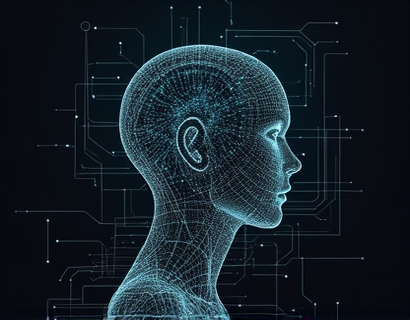Revolutionizing Business Analytics: The Synergy of AI and Blockchain for Secure User Tracking and Insights
The integration of Artificial Intelligence (AI) and Blockchain technology is transforming the landscape of business analytics, particularly in the realm of user tracking and insights. This fusion offers unprecedented opportunities for businesses to gain deep, actionable insights into user behavior, while ensuring a secure and transparent analytics framework. By leveraging the strengths of both technologies, organizations can enhance engagement, refine data-driven strategies, and maintain the trust of their users.
The Role of AI in Business Analytics
Artificial Intelligence has become an indispensable tool in the realm of business analytics. AI algorithms can process vast amounts of data at speeds unattainable by human analysts, identifying patterns and trends that inform strategic decisions. In the context of user tracking, AI can analyze complex user interactions, from clicks and scrolls to time spent on pages and conversion rates. This granular analysis enables businesses to understand not just what users do, but why they do it, allowing for more personalized and effective engagement strategies.
Machine Learning, a subset of AI, plays a crucial role in predicting user behavior. By training on historical data, ML models can forecast future actions, helping businesses anticipate user needs and preferences. This predictive capability is invaluable for content recommendation systems, customer segmentation, and targeted marketing campaigns. AI also enhances the accuracy of analytics by continuously learning and adapting to new data, ensuring that insights remain relevant and actionable.
Blockchain: Ensuring Security and Transparency
While AI offers powerful analytical capabilities, the integrity and security of the data it processes are paramount. This is where Blockchain technology shines. Blockchain provides a decentralized, immutable ledger that ensures data integrity and transparency. Each transaction or data entry is recorded in a block, linked to the previous block, forming a chain that is nearly impossible to alter without detection. This makes Blockchain an ideal solution for user tracking, where data privacy and security are critical concerns.
In a Blockchain-based system, user data is encrypted and stored across a network of nodes, rather than in a centralized database. This distributed approach minimizes the risk of data breaches and unauthorized access. Users have control over their data, deciding who can access it and for what purposes. This level of control not only enhances trust but also complies with stringent data protection regulations such as GDPR and CCPA.
Combining AI and Blockchain for Enhanced Analytics
The true power of AI and Blockchain emerges when they are combined. By integrating AI algorithms with a Blockchain-based data infrastructure, businesses can achieve a robust analytics solution that is both powerful and secure. Here’s how this synergy works:
- Data Integrity: Blockchain ensures that the data fed into AI algorithms is accurate and unaltered. This is crucial for the reliability of insights generated by AI.
- Transparency: Users can trace the origin and usage of their data, fostering trust and compliance with regulatory standards.
- Enhanced Security: The decentralized nature of Blockchain protects user data from breaches and unauthorized access, allowing AI to process sensitive information with confidence.
- Scalability: Blockchain’s distributed architecture can handle large volumes of data, making it scalable for businesses of all sizes.
For instance, in user behavior tracking, AI can analyze data from various sources—website interactions, social media engagement, and purchase history—to create comprehensive user profiles. These profiles are stored on a Blockchain, ensuring that each piece of data is verified and secure. AI algorithms then use this data to identify patterns, predict trends, and provide actionable insights without compromising user privacy.
Real-World Applications
The combination of AI and Blockchain is not just theoretical; it has practical applications across various industries. Here are a few examples:
E-Commerce
In e-commerce, AI-driven analytics can optimize product recommendations and personalized marketing campaigns. By using Blockchain to manage user data, retailers can ensure that customer information is secure and that users have control over their data sharing preferences. This not only enhances the shopping experience but also builds customer loyalty.
Financial Services
Financial institutions can leverage AI for fraud detection and risk assessment, while Blockchain ensures the secure and transparent handling of sensitive financial data. This combination can significantly reduce fraud incidents and improve customer trust in digital banking services.
Healthcare
In healthcare, AI can analyze patient data to predict health outcomes and personalize treatment plans. Blockchain can securely store and manage patient records, ensuring compliance with HIPAA and other privacy regulations. This ensures that patient data is both accessible to authorized personnel and protected from unauthorized access.
Challenges and Considerations
While the integration of AI and Blockchain offers numerous benefits, there are challenges and considerations to keep in mind:
Technical Complexity
Implementing a system that combines AI and Blockchain requires advanced technical expertise. Organizations need to invest in skilled professionals who can design, develop, and maintain such a system. Additionally, integrating existing systems with new technologies can be complex and time-consuming.
Regulatory Compliance
Navigating the regulatory landscape is crucial. Different regions have varying laws and regulations regarding data privacy and security. Ensuring compliance with these regulations is essential to avoid legal issues and maintain user trust.
Cost
The initial setup and ongoing maintenance of an AI and Blockchain-based analytics solution can be costly. However, the long-term benefits in terms of enhanced security, data integrity, and actionable insights often justify the investment.
Future Trends
The future of business analytics is increasingly intertwined with AI and Blockchain. Here are some emerging trends to watch:
Decentralized Analytics Platforms
Decentralized platforms that leverage Blockchain for data storage and AI for analytics are gaining traction. These platforms empower users to own and control their data, while businesses gain access to high-quality, secure data for analytics.
Enhanced Privacy Features
As privacy concerns grow, we can expect more advanced privacy features in AI and Blockchain solutions. Techniques like zero-knowledge proofs and homomorphic encryption will allow AI to process data without revealing sensitive information.
Integration with IoT
The Internet of Things (IoT) generates massive amounts of data, which can be effectively managed and analyzed using AI and Blockchain. This integration will enable more intelligent and responsive systems across various industries.
Conclusion
The fusion of AI and Blockchain is revolutionizing business analytics by providing secure, transparent, and insightful user tracking and analytics solutions. By harnessing the power of these technologies, businesses can gain a competitive edge, enhance user engagement, and make data-driven decisions with confidence. As the technologies continue to evolve, the potential for innovation and growth in the realm of business analytics is vast.





































